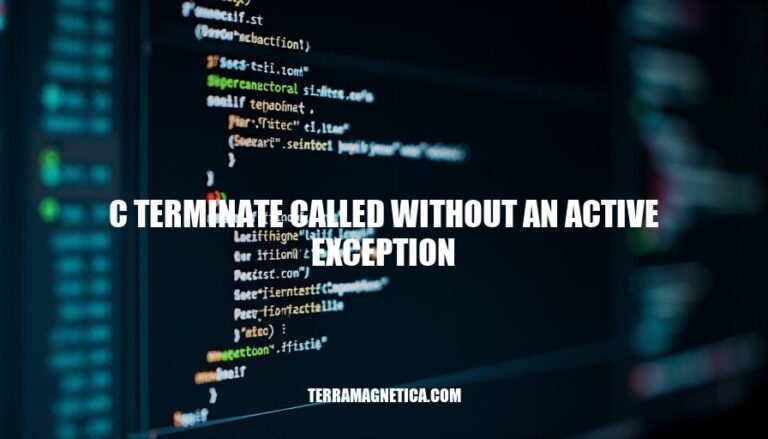


In C++ programming, the error message “terminate called without an active exception” occurs when the program calls std::terminate() without an active exception being thrown. This typically happens in scenarios such as:
Understanding this error is crucial for debugging and ensuring robust exception handling in your C++ programs.
Here are the various causes of the error “terminate called without an active exception”:
Uncaught Exceptions: If an exception is thrown and not caught, std::terminate is called.
Exception Handling Mechanism Failures: If a function invoked by the exception handling mechanism exits via an exception (e.g., a destructor of a local object or a copy constructor constructing a catch-clause parameter), std::terminate is called.
Static or Thread-Local Object Constructors/Destructors: If the constructor or destructor of a static or thread-local object throws an exception, std::terminate is called.
Functions Registered with std::atexit or std::at_quick_exit: If these functions throw an exception, std::terminate is called.
Dynamic Exception Specification Violations: If a dynamic exception specification is violated, std::terminate is called.
Noexcept Specification Violations: If a noexcept specification is violated, std::terminate is called.
Nested Exceptions: If std::nested_exception::rethrow_nested is called for an object that isn’t holding a captured exception, std::terminate is called.
Thread Management Issues: If an exception is thrown from the initial function of std::thread, or if a joinable std::thread is destroyed or assigned to, std::terminate is called.
Condition Variables: If std::condition_variable::wait, std::condition_variable::wait_until, or std::condition_variable::wait_for fails to reach its postcondition, std::terminate is called.
Parallel Algorithms: If a function invoked by a parallel algorithm exits via an uncaught exception and the execution policy specifies termination, std::terminate is called.
Improper Use of Exception Handling Mechanisms: Calling a thread destructor before calling detach or join can trigger std::terminate.
Signal Handlers: Using standard library functions within a signal handler can lead to std::terminate being called.
Here are the methods to diagnose the “terminate called without an active exception” error:
Analyzing Stack Traces:
gdb to get a stack trace.gdb, and when it crashes, use the bt (backtrace) command to see the call stack.Using Debugging Tools:
-fsanitize=address to catch memory errors.-fsanitize=thread to detect data races and other threading issues.Reviewing Code for Common Pitfalls:
These steps should help you pinpoint and resolve the issue effectively.
Here are some strategies to prevent the “terminate called without an active exception” error in C++:
Proper Exception Handling:
std::exception as a catch-all handler.try {
// Code that might throw
} catch (const std::exception& e) {
// Handle standard exceptions
} catch (...) {
// Handle any other exceptions
}
Safe Thread Management:
std::jthread (C++20) which automatically joins the thread on destruction.std::thread t([]{ /* thread code */ });
try {
// Code that might throw
} catch (...) {
if (t.joinable()) t.join();
throw; // Re-throw the caught exception
}
if (t.joinable()) t.join();
Avoiding Terminate Calls:
std::terminate directly.class MyClass {
public:
~MyClass() noexcept {
try {
// Cleanup code
} catch (...) {
// Handle exceptions silently
}
}
};
Signal Handling:
void signal_handler(int signum) {
// Minimal code
}
Implementing these strategies can help prevent unexpected terminations and ensure your program handles exceptions gracefully.
When encountering the “terminate called without an active exception” error in C++, here are some best practices to handle it effectively:
Identify the Cause:
std::terminate is called without an active exception. Common scenarios include:
noexcept function throwing an exception.Implement Custom Terminate Handlers:
std::set_terminate to set a custom terminate handler. This allows you to log the error, clean up resources, or perform other necessary actions before the program exits.#include <iostream>
#include <exception>
void customTerminate() {
std::cerr << "Custom terminate handler called. Exiting program." << std::endl;
std::abort(); // or std::exit(EXIT_FAILURE);
}
int main() {
std::set_terminate(customTerminate);
// Code that might throw an exception
return 0;
}
Ensure Program Stability:
std::terminate.noexcept Wisely: Mark functions as noexcept only if you are certain they won’t throw exceptions.std::thread::join or std::thread::detach to manage thread lifecycles correctly.Debugging:
By following these practices, you can handle the “terminate called without an active exception” error more effectively and ensure your program remains stable and robust.
The “terminate called without an active exception” error in C++ is often a symptom of deeper issues, such as uncaught exceptions, noexcept functions throwing exceptions, or destructors causing stack unwinding. To handle this error effectively, it’s essential to implement robust exception handling and proactive debugging strategies.
Firstly, identify the cause of the error by examining the code and understanding how exceptions are propagated. This involves catching exceptions at appropriate levels, using RAII for resource management, and ensuring thread safety.
Implementing custom terminate handlers can also help mitigate the issue. By setting a custom handler with std::set_terminate, you can log errors, clean up resources, or perform other necessary actions before the program exits.
Proactive debugging techniques are crucial in identifying memory issues or other bugs that might lead to unexpected exceptions. Tools like Valgrind, GDB, or sanitizers can help trace the source of the error and ensure your program remains stable and robust.
In addition, it’s essential to use noexcept wisely, marking functions as noexcept only if you’re certain they won’t throw exceptions. This helps prevent std::terminate from being called unnecessarily.
By following these best practices, you can handle the “terminate called without an active exception” error more effectively and maintain program stability.